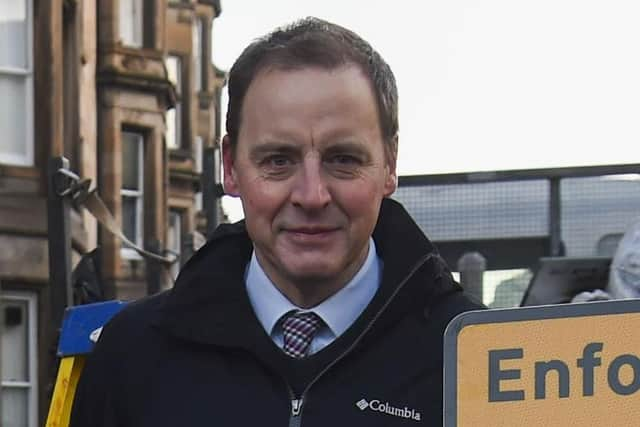Readers' Letters: Edinburgh doesn't want a city only fit and young can access


To which one can only reply – “Utter nonsense”. Very few people in Edinburgh hold this view, and it will sound the death knell for access to central Edinburgh for anyone other than fit and healthy people. The old, the disabled, young parents with prams and buggies, these and many others will be totally discouraged from visiting the town centre, or travelling across town from east to west and north to south. Buses are a nightmare for the old and disabled, we can't walk far, especially in a very hilly city like Edinburgh, and destroying many parts of the city with new tramworks for years to come at eye-watering expense is an act of folly.
What we need is a major scheme of road repairs and cobble removal to make our streets fit for driving (and cycling) and fit for the 21st century.
Advertisement
Hide AdAdvertisement
Hide AdThis terrible plan will ensure only the survival of the fittest in our great city, and to bleat that it is what the citizens want is a total fabrication.
Brian Bannatyne-Scott, Edinburgh
European intrigue
These plans to limit access to Edinburgh city centre are all very well, but for those of us with mobility issues and therefore often car-dependent, are a bit of a nightmare.
I would like to think that they have been well thought out, but seeing the recent traffic calming measures I do have my doubts. The European exercise based upon letting the traffic sort itself out still interests me. It may be impracticable in a city the size of Edinburgh, but then so is cutting Edinburgh in half, as appears to be suggested.
D Gerrard, Edinburgh
What a state!
Stuart Smith enthuses about how successful a separatist Scotland would be (Letters, 29 January). There’s mention of oil, digital technology, life sciences, tourism and “the highly successful financial sector”. How “successful” would these industries be when hamstrung by the increased level of taxation necessary to maintain existing expenditure on social welfare and public services, once the Barnett formula is removed?
Can Mr Smith give even one example of a financial services sector anywhere on this planet which has thrived under a far-left government like the SNP/Greens? What about the additional impact of a hard border and a weak currency on trade, competitiveness and economic stability?
As for oil and gas, it doesn’t seem that the current nationalist leadership have much interest in extracting these resources; just as well we’ve got all those foreign-made wind turbines to keep the lights on!
Mr Smith mentions the Faslane submarine base and RAF Lossiemouth. Given the dangerous times we live in, he rightly states that the UK is keen to hang on to them. Since the peaceful, nuclear-free People’s Republic of Scotland would have no use for such installations, thousands of civilians once employed at these sites or in support and supply roles could presumably retrain to work either in renewables or our ever-expanding civil service?
Mr Smith grudgingly concedes Labour could win a Holyrood majority but predicts that “Labour will be presiding over a Scottish nation, half of which do not want to be in the UK”. A house divided cannot stand; perhaps Mr Smith is implying we’ll need to look at a two-state solution?
Martin O’Gorman, Edinburgh
Waste of money
Advertisement
Hide AdAdvertisement
Hide AdThe points made in The Scotsman editorial calling for increased spending to build up national UK defences are very well taken (30 January). Increases in taxation might be justifiable if these are deemed essential, despite their inevitable contribution to economic depression.
However, since the huge spending on our token net zero policies is a total, futile waste, a money transfer to our defences makes vital good sense. Accordingly, Parliament must repeal the self-harming Climate Change Acts.
Charles Wardrop, Perth
Blinkered views
Scotland will join the rest of the UK to ban disposable vapes – a first. However, surely our well-paid politicians should have seen the problems before allowing them to be sold.
Surely they should have realised they would be given to young people. Surely they should have known they would be thrown away. Surely they should have known that they would end up in landfill and contaminate.
Clark Cross, Linlithgow, West Lothian
Skewed priorities
Millions of pounds of taxpayers’ money is going on NHS salaries for “diversity” employees. Then there is money being spent, including from NHS Lothian, to make amends for historic slavery and to combat racism. Perhaps this might be justified if there was spare money but as we are all painfully aware there is a huge waiting list in Scotland for operations. More taxpayers’ money is also being sent to Gaza. The number of homeless Scots is rising fast. The drugs problems are intensifying.
The word “priority” is often used by the SNP/Green administration but one has to ask if anyone in the Scottish Government actually knows its meaning?
Gerald Edwards, Glasgow
Flood of memories
Talking of ferries yet again (your report, 27 January), in 1953 I lived on a farm near Girvan. On 31 January that year both myself and my bicycle were thrown against the side of a bridge on emerging from the shelter of the trees/hedge of our house roadway.
In Girvan house windows were blown in and sizeable stones were carried from the seashore over the Girvan/Stranraer road and a drystone dyke to land in one of our fields.
Advertisement
Hide AdAdvertisement
Hide AdAs we learned later that day the Stranraer/Larne ferry went under and even later (no TV etc in those days!) that the storm (nameless of course) had caused havoc in the south of England, Belgium and the Netherlands with much flooding and loss of life – 135 from the aforementioned ferry alone and thousands of domestic and other animals.